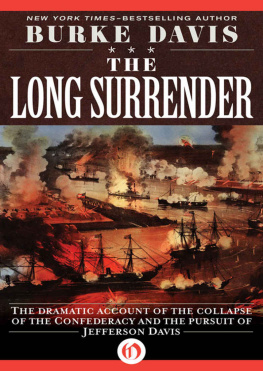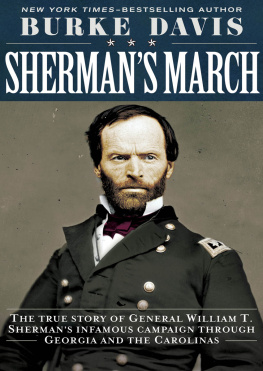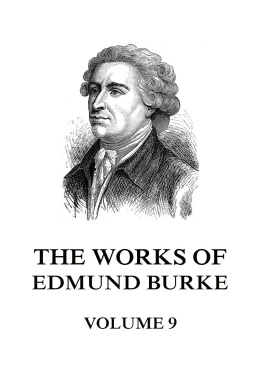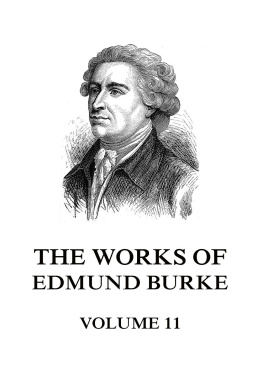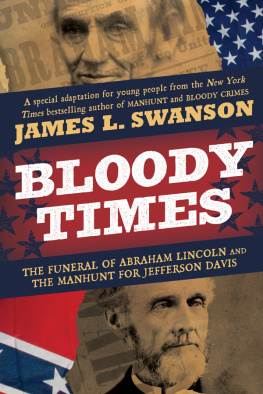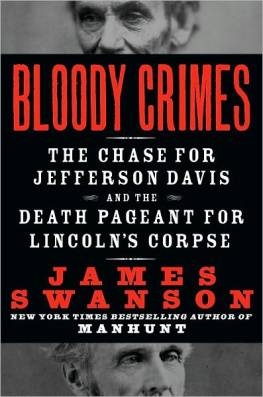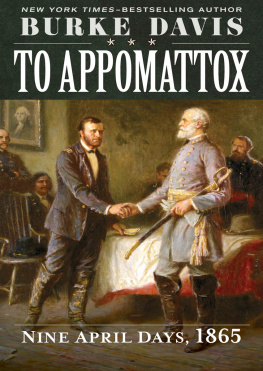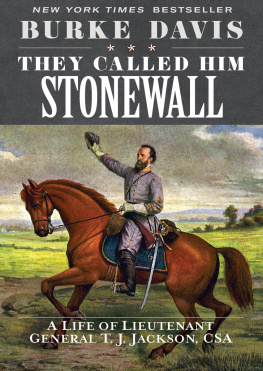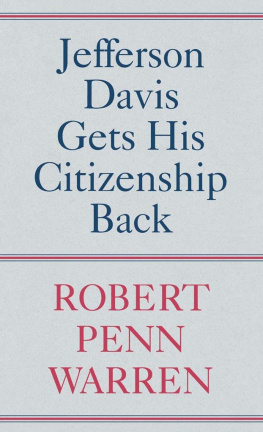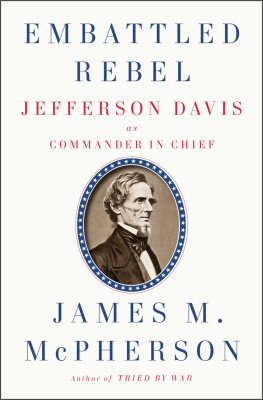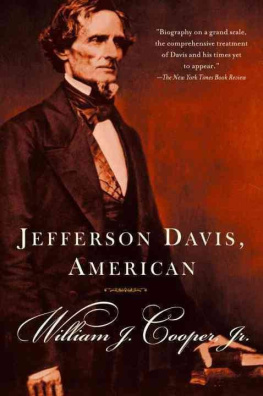Burke Davis - The long surrender
Here you can read online Burke Davis - The long surrender full text of the book (entire story) in english for free. Download pdf and epub, get meaning, cover and reviews about this ebook. City: New York, year: 1985, publisher: Open Road Media;Random House, genre: Detective and thriller. Description of the work, (preface) as well as reviews are available. Best literature library LitArk.com created for fans of good reading and offers a wide selection of genres:
Romance novel
Science fiction
Adventure
Detective
Science
History
Home and family
Prose
Art
Politics
Computer
Non-fiction
Religion
Business
Children
Humor
Choose a favorite category and find really read worthwhile books. Enjoy immersion in the world of imagination, feel the emotions of the characters or learn something new for yourself, make an fascinating discovery.
- Book:The long surrender
- Author:
- Publisher:Open Road Media;Random House
- Genre:
- Year:1985
- City:New York
- Rating:3 / 5
- Favourites:Add to favourites
- Your mark:
- 60
- 1
- 2
- 3
- 4
- 5
The long surrender: summary, description and annotation
We offer to read an annotation, description, summary or preface (depends on what the author of the book "The long surrender" wrote himself). If you haven't found the necessary information about the book — write in the comments, we will try to find it.
The long surrender — read online for free the complete book (whole text) full work
Below is the text of the book, divided by pages. System saving the place of the last page read, allows you to conveniently read the book "The long surrender" online for free, without having to search again every time where you left off. Put a bookmark, and you can go to the page where you finished reading at any time.
Font size:
Interval:
Bookmark:

EARLY BIRD BOOKS
FRESH EBOOK DEALS, DELIVERED DAILY
BE THE FIRST TO KNOW
NEW DEALS HATCH EVERY DAY!

The Long Surrender
Burke Davis

To Juliet
The Confederates have gone out of this war, with the proud, secret, deathless, dangerous consciousness that they are THE BETTER MEN, and that there was nothing wanting but a change in a set of circumstances and a firmer resolve to make them the victors.
Edward A. Pollard, The Lost Cause, 1866
Contents
PART 1
FLIGHT
We have to save the people, spare the blood of the Army and save the High Civil functionaries. Your plan, I think, can only do the last Commanders believe the troops will not fight again. We think your plan impracticable. [You should flee] without loss of a moment.
GENERAL JOSEPH E. JOHNSTON TO JEFFERSON DAVIS
Nowthey will repent
Spring came to central Virginia in late March 1865, in a season of cold rains. Fruit trees bloomed in the city of Richmond and in the scarred, desolate landscape beyond, where a ragged crescent of entrenchments sheltered a Federal army of some 100,000 men. The siege of Richmond and nearby Petersburg was in its ninth month. Within a few days the American Civil War would be four years old.
It seemed unlikely that the Confederate capital would survive to celebrate the anniversary. A perceptive diarist saw symptoms of approaching crisis in the disintegration of the army defending the capital:
Desertions from the army were assuming fearful proportions that no legislative or executive rigor could diminish. Every day saw brigades double-quicking back and forth through the suburbs inadequate to man the vast extent of the lines.
Inflation ravaged the city and threatened the unfortunate with starvation. Flour sold for $1,500 per barrel, live hens for $50 each, butter for $20 per pound and beef for $15. The plight of Richmonders was a grim joke to a woman from Georgia, who had come to be near her husband at his post in the trenches: Close times in this beleaguered city. You can carry your money in your market basket and bring home your provisions in your purse.
But there were those who suffered more keenly. Young A. R. Tomlinson, a wounded soldier serving as a hospital guard, though so weak that he could barely stand watch, could not bring himself to eat as his companions did: The surgeons and matrons ate rats and said they were as good as squirrels, but having seen the rats running over the bodies of dead soldiers, I had no relish for them.
The past few days in the capital had been quiet despite growing pressure from General Ulysses S. Grants Federal besiegers, so near at hand. Though it was clear that the city must soon fall, a stranger might have assumed that all was well. Overcrowded Richmonds 200,000 people went about their affairs almost as usual. The gadfly editor Edward Pollard of the Richmond Examiner wrote: For months past the government had been reticent of all military news whatever; the newspapers had been warned not to publish any military matters, but what should be dictated to them from the War Department; and the public was left to imagine pretty much what it pleased. Indeed, the idea current in the streets was rather pleasant and assuring. Pollard repeated rumors of possible reinforcements for General Robert E. Lees dwindling ranks from the army of General Joseph E. Johnston, now in North Carolina as the last barrier in the path of the invading horde led by General William T. Sherman. The grim Sherman had already driven through the Carolinas after sweeping from Atlanta to the sea. Even in face of such news of disaster in the air, Pollard wrote, Richmonders had not the slightest inkling of the situation as the Confederate capital neared its hour of doom.
But the partisan Pollard, who had heaped vituperation upon President Jefferson Davis and his administration during the war, was not always to be taken literally. By now, at least, Richmonds civilians were less nave than the fault-finding editor assumed. A French businessman who came to the city noted that everyone wore a haggard, scared look. And Captain Micajah Clark, a clerk in the Presidents office, said that the Treasury had been issuing coin for more than a month, changing currency into silver for the relief of the peoplecoins rarely seen in the wartime Confederacy. Clark and most other Richmonders realized that this exchange had but one purpose: coin might be spent after the fall of the city, when Confederate bills would be worthless. The ratio of paper to silver dollars was 60 to 1, and rising.
As Pollard charged, government propaganda had indeed misled many people, but more observant residents saw that the end was at hand. The fall of the city was so obviously imminent that only one Cabinet members wife remained. An early exodus of government clerks and archives had begun March 1, and supplies of machinery, arms and food had been shipped southward with them to the relative safety of the interior. Congress had disbanded soon afterward with no plans to reconvene, departing amidst bitter exchanges with Davis that left the President worn and exhausted, so his wife said. Another observer, noting that Congress had turned madly against him, saw Davis as a sick lion attacked by jackals: It is a very struggle for life with him He is in a sea of trouble, and has no time or thought for anything but the safety of the country.
More recently, within the past few days, President Davis was known to have sent most of the food in his mansion to the citys hospitals, as if preparing for his own flight. The enigmatic Confederate President, whose public manner was that of a stern, unyielding ascetic, became the focus of attention in the final days of the capitals life. The leader of the failing rebellion, though by no means a chameleon in dealing with people, did seem to inspire the most impassionedand extremereactions from his frustrated subjects, reactions ranging from hatred to adoration. Those who knew him best still regarded him as the salvation of the Southern causebut his early role as hero and founder of the Confederacy had altered greatly in recent months.
Thousands of Southerners, inconsolable in face of defeat and with passions inflamed by a press hostile to Davis, had made him a scapegoat, a symbol of their blasted hopes.
Physically Jefferson Davis had been stricken by pressures of war. No longer did he look every inch the President, as he had during his 1861 inaugural. As now seen on Richmonds streets he was pale, feeble and distraught. He had become an incurable insomniac, and his condition could not have been improved by the regimen imposed upon him by his wife, Varina, and his doctors. She forced Davis to sniff chloroform and rubbed the anesthetic on his temples. The President also inhaled the vapors of burning rosemary leaves, and for a time had been dosed daily with two grains of opium, five grains of quinine, a teaspoonful of calchocum winehad been almost blinded by an ulcerated cornea and attacks of neuralgia. Varina, his second wife and eighteen years his junior, had also begun to age. She had lost the sensuous, doe-eyed beauty of her girlhood and was no longer The Mississippi Roseshe was now spoken of as that Western squaw. An officers wife had lately described the couple, He looks badlyold, grey and wrinkled But she is enormously fat, and very cross and ill-tempered.
Next pageFont size:
Interval:
Bookmark:
Similar books «The long surrender»
Look at similar books to The long surrender. We have selected literature similar in name and meaning in the hope of providing readers with more options to find new, interesting, not yet read works.
Discussion, reviews of the book The long surrender and just readers' own opinions. Leave your comments, write what you think about the work, its meaning or the main characters. Specify what exactly you liked and what you didn't like, and why you think so.

